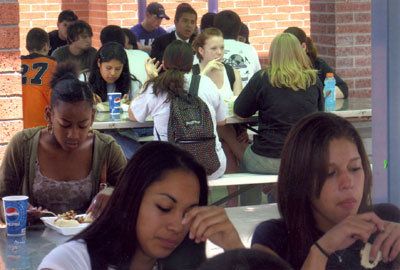All Nonfiction
- Bullying
- Books
- Academic
- Author Interviews
- Celebrity interviews
- College Articles
- College Essays
- Educator of the Year
- Heroes
- Interviews
- Memoir
- Personal Experience
- Sports
- Travel & Culture
All Opinions
- Bullying
- Current Events / Politics
- Discrimination
- Drugs / Alcohol / Smoking
- Entertainment / Celebrities
- Environment
- Love / Relationships
- Movies / Music / TV
- Pop Culture / Trends
- School / College
- Social Issues / Civics
- Spirituality / Religion
- Sports / Hobbies
All Hot Topics
- Bullying
- Community Service
- Environment
- Health
- Letters to the Editor
- Pride & Prejudice
- What Matters
- Back
Summer Guide
- Program Links
- Program Reviews
- Back
College Guide
- College Links
- College Reviews
- College Essays
- College Articles
- Back
Free Lunch in Schools
Do you think that public schools should provide free breakfast and lunch to all students. Well more than 20 million children rely on the free and reduced price lunch during the school year and only 3 million of them get a free meal from federally funded programs in summer. Imagine sitting in class staring at the clock for when the bell is going to ring for lunch or even walking into school hungry but knowing that you're not going to wait in the line because you don't want to be considered a “poor kid”. About 8 - 12 % of school age students skip breakfast everyday and about 25% of teens skip breakfast when they are in high school. All students in public schools should be provided a free lunch and breakfast so that they are participating in school and aren't hungry.
Providing all students a free breakfast and lunch helps so that it does not stigmatize the students that are on “Free Lunch”. Imagine being a young kid and all your friends brought a lunch from home and you are the only one who doesn't have a lunch, and you friend asks where is your lunch and you say you forgot in but deep down inside you really know that you didn't forget it you just didn't want them to know that you are on “ Free Lunch” so providing all students with free lunch and breakfest embarreses students less who actually need help. It is also eliminated the sense of who needs “free lunch” and it eliminates the thought of thoses who bring a lunch are considered rich and those who wait in the cafeteria line are considered poor.
In high poverty areas it's easier to just provide all students with free lunch because the administrative cost of running free and reduced lunch is very expensive. When kids keep charging money to their account and they don't have any money on the account the schools have to notify the parents of the late fees which adds even more administrative work. The paper work is sometimes complicated and sometimes you can't understand it or maybe it's not even in english. This is putting them in an uncomfortable situation, there jobs are already hard enough they shouldn't have to track families down and ask for money and even sometimes when they know there is no money available. For example
Students with a full stomach learn better then the kids who are hungry. Educators say that coming to school hungry leads to lack of energy or motivation, Behavior problems, tiredness, feeling sick, poor academic performance and more. Kids are embarrassed to go through the school lunch and breakfast line so they just skip the meal so they won't be considered the “poor kids” Teachers saw that having a good meal shows a 93% more chance of concentration.
Some people feel that if a family can afford to provide lunch for their child, then that’s what they should do. “Studies show that a diminished parental role in a child’s nutritional development has real consequences,” writes Julie Gunlock, a senior fellow at the Independent Women’s Forum. “And that’s exactly what happens when government takes on the role of primary food-provider for school-age children.” Feeding your child is part of being a parent. Gunlock says that “the federal school lunch program has evolved into a program serving not only poor children, but children whose parents, for whatever reason, have decided not to prepare a home-packed meal for their school-bound child.” It’s one thing for the government to help out families who cannot, for whatever reason, afford good breakfasts and lunches for their children. It’s a totally different if the government is paying to feed children whose parents just can’t be bothered.
There are many reasons why schools should provide free lunch free lunch and breakfast to students every day. One reason is it doesn't stigmatize the kids who are on “Free Lunch”. The second reason is that in high poverty areas it's easier to just provide all students with free lunch because the administrative cost of running free and reduced lunch is very expensive. The final reason is that students with a full stomach learn better then the kids who are hungry. Having kids not eat there lunches from the becasue of being considered poor needs to stop all kids should have the rigt to eat lunch without being made fun of.

Similar Articles
JOIN THE DISCUSSION
This article has 0 comments.
